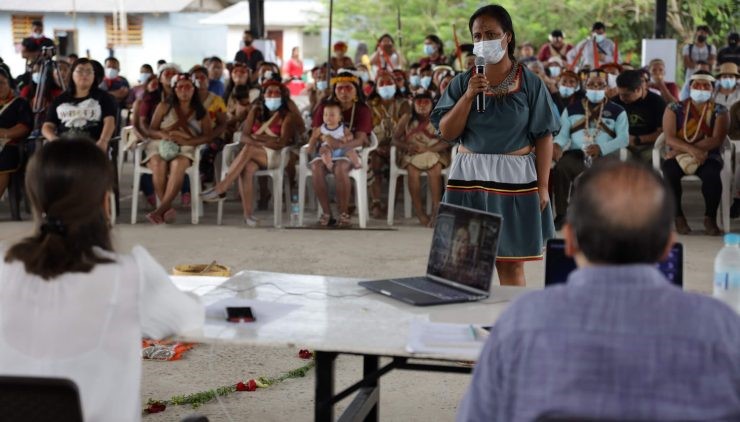This website uses cookies so that we can provide you with the best user experience possible. Cookie information is stored in your browser and performs functions such as recognising you when you return to our website and helping our team to understand which sections of the website you find most interesting and useful.
Vance Center Supports Historic Win for Indigenous Peoples
February 2022
(Photo Credit: Amazon Frontlines)
The Constitutional Court of Ecuador relied on an amicus brief facilitated by the Vance Center in an historic decision on the rights of Indigenous peoples to free, prior and informed consultation (FPIC) in activities that affect the use and enjoyment of their lands. The Court found that the Ecuadorian government had failed to consult adequately with, and protect, Indigenous peoples in the granting of mineral concessions in lands adjacent to their territories.
Professor James Anaya, former UN Special Rapporteur on the Rights of Indigenous Peoples and world-renowned expert on Indigenous rights submitted the brief with the support of Todd Crider and Rafael Loureiro of Simpson Thacher & Bartlett LLP, and in coordination with the NGO Amazon Frontlines. Crider is the founding chair and member of the executive subcommittee of the Vance Center Committee.
Several Indigenous organizations challenged the grant of mining concessions on land bordering the territory of the Cofan de Sinangoe community. The organizations argued that government agencies had failed to consult with the community prior to granting the concessions, even though the mining had significant downstream environmental consequences on the community’s ability to access clean water and food, ensure its physical safety, and maintain a healthy environment. In particular, the mining would have polluted the Aguarico, Chingual and Cofanes Rivers, which Indigenous communities rely on for fishing, agriculture, and drinking water. The plaintiffs further argued that the government had failed to take sufficient action to protect them from illegal mining on, and adjacent to, their traditional lands.
In a landmark decision, the Court found in favor of the Indigenous communities. Among other findings, the Court concluded that the government’s actions violated the Indigenous communities’ constitutional rights to FPIC. Noting that, for Indigenous communities, land has “special importance as part of their inherent cultural identity and spiritual values”,[1] the Court affirmed that the Ecuadorian state has specific obligations when making decisions that affect Indigenous lands. It rejected the government’s submissions that activities merely adjacent to Indigenous territories did not require consultation: downstream consequences, and Indigenous conceptions of ownership, must be taken into account. The Court enumerated specific government obligations, including requirements related to timing, good faith, absence of coercion, seeking agreement and consent, ability to compromise, community access, due diligence, and ensuring that communities have access to all necessary information. In this case, it said, the government had fallen short of these standards.
The Court in its decision considered and quoted from Professor Anaya’s brief. The Justices affirmed Professor Anaya’s observation that “[a] direct and considerable impact on the lives or territories of Indigenous peoples creates a firm presumption that the proposed measures must not be adopted without the consent of the Indigenous peoples. In certain contexts, the presumption should be converted into a prohibition of the measure or the Project if there is no consent of Indigenous peoples.”[2]
The case was also significant because it marked the first time that the Ecuadorian Constitutional Court convened its formal proceedings in Indigenous lands. In November 2021, the Court traveled to the Cofan community to hear moving testimony from elders and children. Its decision extensively referenced this testimony and relied on it in concluding that protection of Indigenous communities could not be framed only by western conceptions of property interests. Instead, it reasoned that courts must consider Indigenous interests from “the context of the communities, peoples and ancestral nations and their relation with the territory, from the particularities of each case in question”.[3]
The case is of special significance in the light of Ecuador’s recent commitment to double national oil production, a move with the potential to contribute significantly to global greenhouse gas emissions and lead to further localized harms for Indigenous and rural communities. The Vance Center is supporting an amicus brief in another matter before the Ecuadorian Constitutional Court, relating to a devastating 2020 oil spill, while earlier this month, another major oil spill in Ecuador highlighted the hazards associated with fossil fuel development.
In the Cofan de Sinangoe community’s case, the Court did leave open the possibility of permitting resource extraction even when community consent is not obtained. However, it set out standards for community engagement, indemnification, and mitigation. These standards are a significant advance for Indigenous groups whose interests have long been neglected.
[1] “… la especial importancia que tienen sus tierras o territories y la naturaleza como parte inherent de su identidad cultural y sus valores espirituales”.
[2] “Un efeto directo y considerable en la vida o los territories de los pueblos indígenas establece una presunción sólida de que la medida propuesta no deberá adoptarse sin el consentimiento de los pueblos indigenas. En determinados contextos, la presunción puede convertirse en una prohibición de la medida o el proyecto si no existe el consentimiento de los indígenas.”
[3] “… la base del contexto de las comunidades, pueblos y nacionalidades ancestrales y su relación con el territorio, así como de las particularidades de cada caso en cuestión.”


